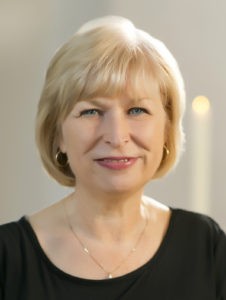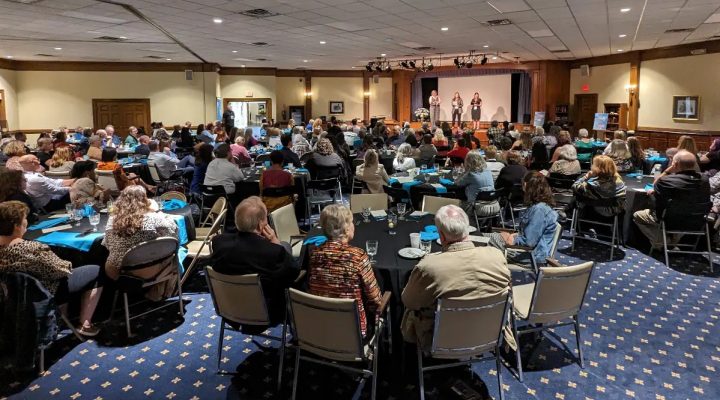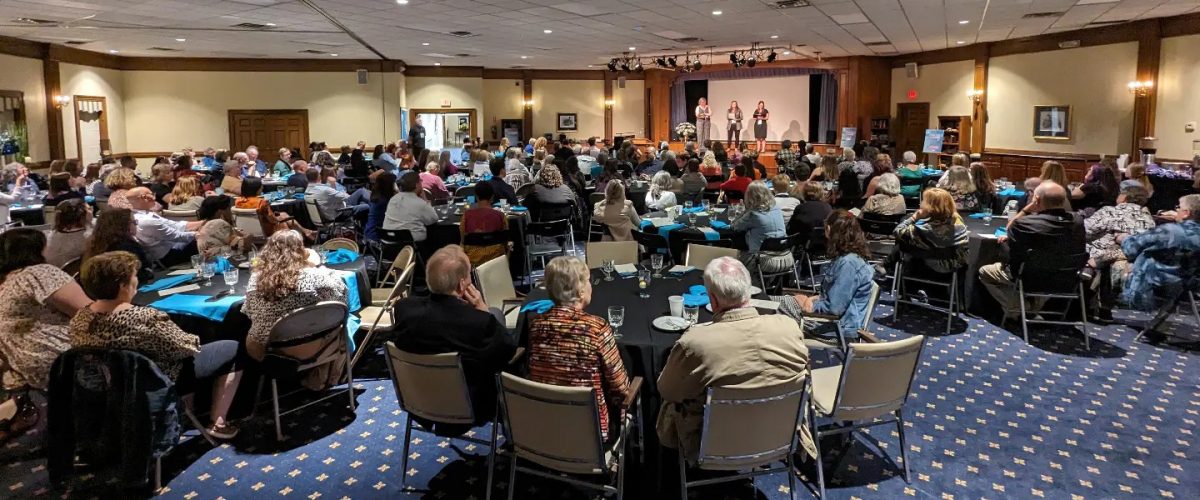“What is it you women want?”
That’s the lingering question most often asked of Baptist women in ministry, Pam Durso told the 40th anniversary gathering of Baptist Women in Ministry Oct. 3.
The former executive director of the organization, who now leads Central Baptist Seminary in Kansas, got ready agreement from the crowd of about 200 people assembled at Broadway Baptist Church in Louisville, Ky.

Pam Durso
The first thing women want is not to be asked that question, Durso quipped to laughter.
“We women don’t ever, ever want to be asked this question again,” she said. “It’s rude, it’s demeaning, and it’s a stupid question.”
And contrary to popular belief, some questions are, in fact, stupid, she said. “I’m saying that as one who spent my fair share of time in the classroom answering student questions. There are stupid questions.”
“We women, we do not want you to talk to us as if there even is a you.”
“We women, we do not want you to talk to us as if there even is a you women. We women. We’re not one. We are many. And we come from different places, different contexts, different cultures. We speak different languages. We hold different theologies. We have different convictions. We are a beautiful array of different experiences. We are not ‘you women.’”
Therefore, “we women” do not want one singular thing,” she reported. “We want many things. We need different things individually. We want and need different things. Our wants and needs are as diverse and as beautiful as the experiences and circumstances of our lives.”
Acknowledging the intentional humor in her opening, Durso then presented a list of things women in general want — some lighthearted, others not, but all true.
- “In a world that seems to always have gendered bathrooms, we women want more stalls. We’re tired of waiting in line.”
- “In a society that is overly focused on women’s bodies, we want to be free from the expectation of body size and body shape. We are tired of being made to feel like we have to be thin or to have to apologize for or seek to hide our bodies when we are perceived to be too large, too heavy, too much.”
- “In a culture where women are expected to be nice and to smooth out all the hard places to make everyone in the room feel comfortable … we women no longer want to carry that burden alone. We want everyone in the room to manage their own anxieties.”
- “We women don’t want to be talked at or talked over or interrupted or corrected. We are tired, bone tired of being mansplained.”
- “In a world where women are charged with cleaning up messes and clearing off tables and picking up after meetings and sorting out family feuds and office conflicts, we women are exhausted. We need some help. What we want is for others not to walk away and think some invisible fairies or magic wands will whisk away your half-empty coffee cups and your crumpled-up napkins and your hysterical children.”
- “In a society in which women are supposed to be the best moms in the world and to love their children unconditionally and give every single moment of every single day to their children while also working full time and serving their churches and participating in community activities, we women just can’t. We can’t do it all. We can’t be our best at everything. We need some space to fail, to mess up, to drop some balls. We need a break from the expectations of overachieving, the expectations of perfection.”
Female ministers have some additional ideas, she continued:
- “In a world where women preach, we want pockets on clergy robes so we don’t have to attach those pesky, ginormous mic packs to the back of our bras and hope for the best. … We want pockets in dresses. We want pockets in jackets.”
- “We want sound systems that have been adapted and regulated so our voices are heard and projected because we’re tired of complaints about our squeaky voices or our soft voices. We want churches and conference sites to put money and effort into getting better sound systems.”
- “In churches where women stand behind the pulpit, we want the after-sermon comments to focus on our content, not on our shoes, not on our hair, not on our jewelry, and not on our curves.”
- “In churches in which women don’t often preach, we want women to be invited into the pulpit and not asked to preach from the floor. We don’t want to have to pretend our words are less than a sermon or our value is less than male preachers.”
- “In the hard world of ministry searches, we women don’t want to have to be 30% to 40% better than all the men in the pool of candidates. We don’t want to be expected to make grades so superior to every man we went to seminary with. We don’t want to have to have significant depth of administrative experience or be the most gifted pastoral caregiver in the entire world to be a better preacher than Fred Craddock or Billy Graham.”
- “We don’t want search committees that look at our resumes and say, ‘Oh, she doesn’t have any pastoral experience. She’s only been an associate pastor or a youth pastor, or she has some gaps in her ministry service. Looks like she took a few years away. Maybe she had children. Yes, she isn’t really serious about her calling.”
- “We women also don’t want search committees who say she was a pastor once, but she left the church. She probably caved under pressure. She doesn’t have staying power. She lacks courage. She’s not going to be a good candidate.
- “We women don’t want to be compared to men who have more opportunities and more open doors. We don’t want to be valued by just what is on our resumes. We want committees who look beyond our titles, our years of experience and see our passion and our commitment and our gifts.
- “In a hard world where terrible and horrible things happen every single week and where as ministers we often hear terrible and horrible things shared with us, we women want to be free to shed tears without being deemed too emotional or unbalanced or irresponsible. We want space to feel our feelings and be authentically ourselves in the midst of crisis and chaos.”
- “We women want equitable pay. We no longer want to earn 76 cents when our male counterparts are earning a dollar. We want fair pay. We want benefits. We need health insurance, and we need retirement plans.”
- “We women want for our sisters of color … to be paid for their services and for their ministry. We are tired of seeing their skills and their gifts being used by churches. And all too often they’re not paid anything for that service or their gifts. We women want them to have salaries and benefits and respect.
- “We women want our queer sisters to no longer have to hide who they are in order to be hired or called by Baptist churches or nonprofits. We want them to be treated with compassion and respect and with equity.”
- “In congregations where families are valued and supported, we want generous parental leave policies and we want them offered to us. We don’t want to have to beg for six weeks or maybe eight if we’re lucky. We don’t want to have to do the research of what other churches provide. We don’t want to have to justify our worth for fair treatment and compassion.”
- “In a world where sexual harassment and gender harassment and abuse of women is all too prevalent, even in our churches, we women want to be believed when we report toxic male leaders who have been abusive or inappropriate. … We women want to be able to speak truth and confront abuse and confront those toxic behaviors in the church without fear of being fired or disgraced or demeaned or labeled as complainers or whiners or Jezebel.”
- “We women also do not want to be told that what happened to us is not universal. That not all women experience that same thing with that man. So it must be our problem. We no longer will tolerate the implication that somehow we are responsible for the bad behavior of others.”
Against this long list of wants, Durso offered evidence of advances made from the wants of the foremothers of Baptist women in ministry 40 years ago. Decades ago, those early women in ministry said they had no visibility, lacked available positions, lacked power and authority, language, pastoral care, access to education, help with two-career families, special development, acceptance being single and a minister.
“We have made progress because of the hard, hard work and the emotional and spiritual investment, the resiliency of our foremothers.”
“Reading their list gave me great comfort … and great hope,” she said. “We’ve made progress. We have made progress because of the hard, hard work and the emotional and spiritual investment, the resiliency of our foremothers. …
“They wanted visibility. Look around you. We have visibility. They wanted available positions. We have available positions, maybe not enough, but now women are serving in all ministry roles from pastor to chaplain to nonprofit leader, pastoral counselor to president. And with those positions comes power and authority.
Baptist women are “slowly moving” toward mutuality and collaboration in some Baptist settings, Durso noted. “We’re getting there. We’re growing closer.”
The foremost area in which little progress has been made is support for women who are single and serve as full-time ministers, she acknowledged. “We still have plenty of work to do to provide single pastors and leaders with a kind of support they need and not expect them to work all the hours, give up their days off and their vacation because they don’t have a partner to go to.”
Most of all, Baptist women in ministry have found affirmation — often through the work of BWIM, she said. “Affirmation has become part of the shared culture of the BWIM world. … We as women have learned not to wait for the broader Baptist world to provide affirmation. We do it for one another. We name each other’s gifts. We call out each other’s strengths. We name it for one another. That is part of who we are as Baptist women in ministry.”
Related articles:
Baptist Women in Ministry challenged to reach out to women of color
BWIM’s 40th anniversary gathering features new documentary
Experiences of female clergy are often overlooked in accounts of the SBC schism, professor says


